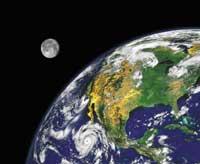What the Moon dragged from Earth
The Earth and the Moon form a very curious couple: there is none other that has the same characteristics in the solar system. The most remarkable of these characteristics is the proportion between the sizes of both, that although the Earth is greater than the Moon, the difference is not so much.
It can be compared to the Pluton-Karon system, but Karon does not revolve around Pluto, but both revolve as a double system, one around the other.
Gradually the Moon escapes from the gravitational field of Earth. It is ever further from the earth. And in the flight it seems to carry a stolen material from the Earth, because the Moon has the same composition as the Earth.

How did the strange couple arise? Considering these and other characteristics, scientists formulated two main hypotheses. Some believe that both emerged in a clash between two planets. Others believe that both arose at once, from the same material, and that there was no collision. Now, astronomers at the Swiss Federal Institute of Technology have shown that the first hypothesis is correct.
To do this, Swiss scientists have compared the stones from the Moon to those received on Earth, finding a significant difference between the proportion of iron isotopes.
According to this hypothesis, the temperature of the interplanetary collision would be 1,700 °C, enough to evaporate the iron atoms. Lighter isotopes evaporate before heavy ones during this process.
Consequently, in the event of a collision, the light isotopes evaporated from the Moon and stacked into the material that formed the Earth. This hypothesis has been confirmed by the result of the experiment of Swiss scientists, since in the stones of the Moon the proportion of iron 57/iron 54 is greater than in those of the Earth. Only the collision hypothesis can explain this result.
The Moon, therefore, carries in the stones the material stolen from the Earth and the subtracted from the Moon by the Earth.





